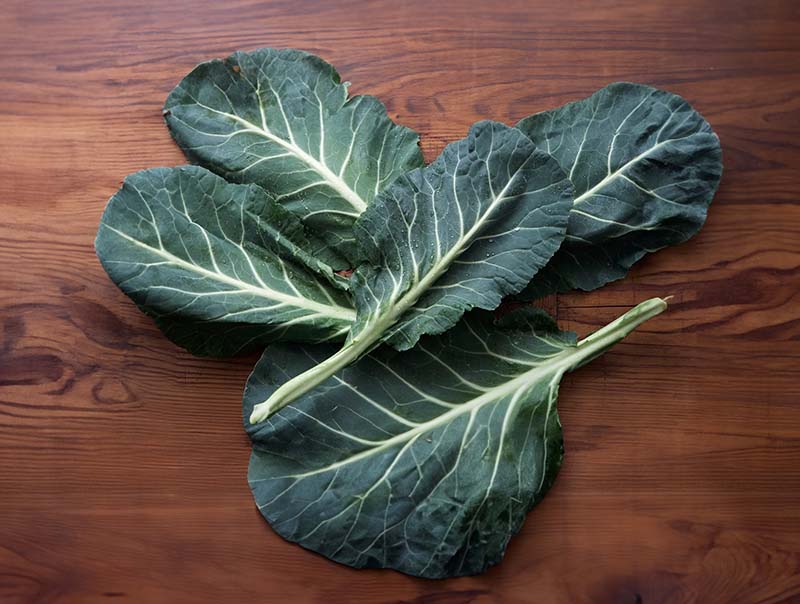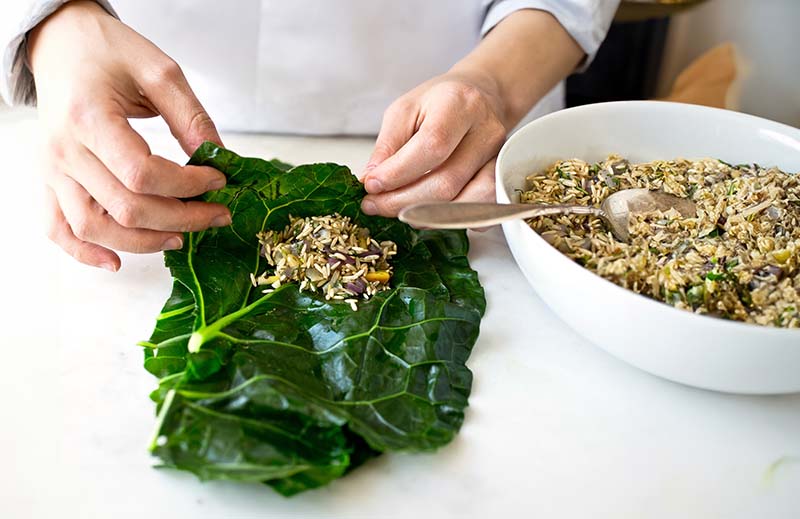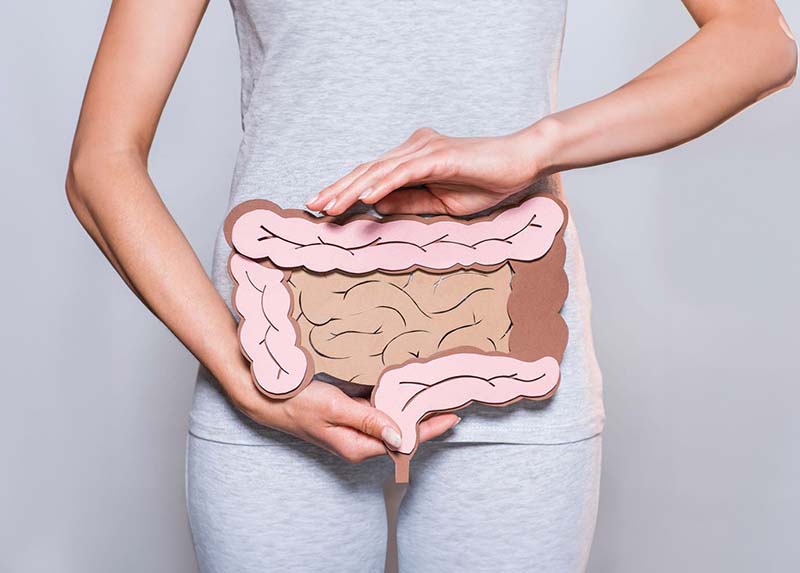“Is Collard Greens Good for Weight Loss?” Collard greens, a key member of the cruciferous family similar to kale, are distinguished by their ample, smooth, and flat leaves, contrasting with the curly and narrow foliage of kale. This versatile vegetable is a powerhouse of vitamins, minerals, and antioxidants.
Regular inclusion of collard greens in one’s diet not only contributes to a reduced risk of various diseases but also supports effective weight management, affirming their relevance to health-conscious dietary regimens.
Is Collard Greens Good for Weight Loss?
Collard greens are an excellent choice for anyone looking to shed some pounds. They’re incredibly low in calories yet high in fiber. This fiber content is key – it helps keep you feeling full longer, effectively curbing your hunger and decreasing your overall calorie intake, which is essential for weight loss.
But it’s not just about what collard greens lack; it’s also about what they offer. They’re loaded with essential vitamins and minerals, making them a nutritious powerhouse in any weight loss diet.

Incorporating collard greens into your daily diet is a smart move for those on a weight loss journey. They’re versatile too – you can sauté them, blend them into smoothies, or even use them as a fresh wrap alternative. It’s not just about cutting back but also about enriching your diet with the right kind of nutrients, and collard greens fit the bill perfectly.
Nutritional Composition Of Collard Greens
Let’s explore the impressive nutritional composition of collard greens, as per the USDA. One cup of raw chopped collard greens offers a variety of essential nutrients:
- Calories: A mere 11.5 calories per cup, making them an ideal choice for those aiming to manage their calorie intake during weight loss efforts.
- Fat: Just 0.22 grams of fat, which is minimal and heart-healthy.
- Sodium: Low sodium content at 6mg, making them suitable for individuals watching their salt intake.
- Carbohydrates: With 2 grams of carbohydrates, collard greens are a low-carb option.
- Fiber: A commendable 1.4 grams of dietary fiber per cup, aiding in digestion and providing a feeling of fullness.
- Sugar: Only 0.2 grams of sugar, ensuring minimal impact on blood sugar levels.
- Protein: Collard greens provide 1 gram of protein, which contributes to overall dietary protein intake.
- Calcium: An impressive 83.5mg of calcium, supporting bone health and overall well-being.
In addition to these macronutrients and minerals, collard greens offer a wealth of vitamins:
- Vitamin K: Collard greens are an excellent source of vitamin K, crucial for blood clotting and bone health.
- Vitamin A: They provide a good dose of vitamin A, essential for vision and immune function.
- Vitamin C: A valuable source of vitamin C, which boosts immunity and aids in collagen production for healthy skin.
- Folate: Collard greens are rich in folate, a B-vitamin necessary for cell division and DNA synthesis.
- Beta-Carotene: Containing beta-carotene, these greens support overall health and may contribute to antioxidant protection.
- Lutein and Zeaxanthin: Collard greens also contain carotenoids like lutein and zeaxanthin, known for their eye health benefits.
Health Benefits of Collard Greens
Collard greens are a remarkable addition to your diet, offering a multitude of health benefits, thanks to their rich nutritional profile. Let’s explore how incorporating these dark, leafy greens into your meals can support your overall health:
Contribution to Cardiovascular Health
Collard greens belong to the brassica family, known for their nutritional benefits. They contain folate, which helps lower levels of homocysteine in the blood, reducing the risk of cardiovascular diseases, blood clots, and artery hardening.

Enhancement of Bone Integrity
Collard greens are an excellent source of vitamin K, vital for healthy bones. Adequate vitamin K intake aids calcium absorption and strengthens bone structure, reducing the risk of osteoporosis.
Improvement of Cholesterol Profile
These greens contain soluble fiber, which lowers LDL cholesterol by binding with it in the intestine and promoting its excretion. Additionally, it encourages the liver to produce more bile salts, further reducing blood cholesterol levels.

Strengthening the Immune System
Collard greens provide essential vitamins A and C, which play crucial roles in supporting a robust immune system. Vitamin C maintains healthy blood cells, while vitamin A supports the function of T-cells, which combat invading pathogens.
Facilitation of Regular Digestion
The soluble fiber in collard greens increases stool bulk, promoting easier passage and helping to combat constipation.

Potential Reduction In Type 2 Diabetes Risk
Research suggests that consuming leafy greens like collard greens may lower the risk of developing type 2 diabetes. These veggies contain antioxidants that protect against diabetes-related damage, and their fiber content stabilizes blood glucose levels.
Preservation of Vision
Collard greens contain lutein and zeaxanthin, antioxidants known to protect against age-related eye conditions like cataracts and macular degeneration, potentially preserving your eyesight.

Support For Fetal Development
For individuals planning pregnancy or already expecting, collard greens are a valuable source of folate, crucial for preventing neural tube defects like spina bifida in developing fetuses.
Potential Cancer Protective Effects
Including collard greens in your diet may lower the risk of developing cancer. They are rich in carotenoids and glucosinolates, antioxidants that protect against free-radical damage and DNA damage, potentially reducing the risk of cancer.

Quick And Nutrional Collard Green Recipes For Weight Loss
Here are two quick and nutritious collard green recipes tailored to support your weight loss journey:
Collard Greens with Lemon-Garlic Shrimp

Ingredients:
- 1 pound large shrimp, peeled and deveined
- 2 cloves garlic, minced
- Juice of 1 lemon
- 2 tablespoons olive oil
- Salt and pepper, to taste
- 2 bunches collard greens, washed and chopped
Instructions:
- In a large skillet, heat the olive oil over medium heat. Add the minced garlic and cook for 1-2 minutes, or until fragrant.
- Add the shrimp to the skillet and cook for 2-3 minutes per side, or until they turn pink and are cooked through.
- Squeeze the lemon juice into the skillet and toss to combine. Season with salt and pepper to taste.
- In a separate pan, steam the collard greens for 5-7 minutes, or until they’re tender but still crisp.
- Serve the lemon-garlic shrimp over a bed of steamed collard greens.
Collard Green and White Bean Soup

Ingredients:
- 2 cups chopped collard greens
- 1 cup chopped onion
- 2 cloves garlic, minced
- 1 tablespoon olive oil
- 1 can (15 oz) cannellini beans, drained and rinsed
- 1 can (15 oz) white beans, drained and rinsed
- 6 cups vegetable broth
- 1 cup chopped tomatoes
- 1/2 teaspoon red pepper flakes
- Salt and pepper, to taste
Instructions:
- In a large pot, heat the olive oil over medium heat. Add the chopped onion and cook for 3-4 minutes, or until it’s softened.
- Add the minced garlic to the pot and cook for 1 more minute.
- Stir in the chopped collard greens and cook for an additional 3-4 minutes, or until they begin to wilt.
- Add the drained and rinsed cannellini beans, white beans, vegetable broth, chopped tomatoes, and red pepper flakes to the pot. Stir well to combine.
- Bring the soup to a boil, then reduce the heat to low and let it simmer for 20-25 minutes, or until the greens are tender and the flavors have melded together.
- Season the soup with salt and pepper to taste.
- Serve the collard green and white bean soup hot, garnished with a sprinkle of chopped fresh herbs, if desired.
Both of these collard green recipes are not only delicious but also high in fiber, vitamins, and minerals while remaining low in calories, making them ideal for a weight loss diet. Enjoy the health benefits and flavors they offer as you work towards your weight loss goals.
Can Collard Greens Harm Your Health?
If you’re on a blood thinner like warfarin, maintaining a consistent intake of vitamin K is crucial. This vitamin plays a significant role in blood clot formation, which is exactly what blood thinners are designed to control. Given that collard greens are a rich source of vitamin K, exceeding the daily recommended amount, it’s important not to make drastic changes to your intake of these greens if you’re using a blood thinner.
Remember, any significant dietary adjustments should be made under medical guidance, especially if you have health conditions. Consulting with your doctor before altering your diet ensures that you’re making safe and informed choices about your health.
Conclusion
In conclusion, “Is Collard Greens good for weight loss?” is answered with the nutritional benefits of this green superfood, providing valuable insights and delicious recipes to support your weight loss journey.
Now, we’d love to hear from you! Share your success stories or thoughts in the comments below. And if you’re hungry for more health and beauty tips, don’t forget to explore our other blogs at Blonde Beauty. Your path to a healthier, more radiant you begins here!

Laureate Professor Clare Collins
Professor Clare Collins is a leading expert in nutrition and dietetics at the School of Health Sciences, part of the College of Health, Medicine and Wellbeing. Her work is changing the way we think about food and health. She grew up as one of nine children and was the first in her family to finish high school and go to college. This background gave her a strong work ethic and a deep appreciation for seizing opportunities.
As the Director of the Hunter Medical Research Institute’s Food and Nutrition Program and a recipient of three NHMRC Research Fellowships, Professor Collins is making a big difference in public health. She focuses on helping people who are often overlooked, using new technologies like apps and online programs to improve their nutrition and reduce the risk of chronic diseases.
Professor Collins is well-respected and has been recognized as a Fellow in four major health and science organizations. She leads a diverse team of experts, including dietitians, computer scientists, and engineers, working together on global health projects.
Her achievements are impressive. She has received over $29 million in research funding, published more than 450 papers, and helped 35 PhD and Master’s students complete their degrees. She’s also active in sharing her knowledge with the public. She has developed tools like the Australian Eating Survey and the Healthy Eating Quiz, and she often appears in the media to talk about nutrition.
PUBLISHED ARTICLES
- Collins, C. (2019). “The Effect of a Pilot Dietary Intervention on Pain Outcomes in Patients Attending a Tertiary Pain Service.”
- Collins, C. (2022). “Variation in cardiovascular disease risk factors among older adults.”
- Collins, C. (2022). “Evaluation of an online intervention for improving stroke survivors’ health-related quality of life: A randomised controlled trial.”
These articles show Professor Collins’s commitment to understanding how better nutrition can improve health. Her work is important for researchers, doctors, and anyone interested in healthy living.
